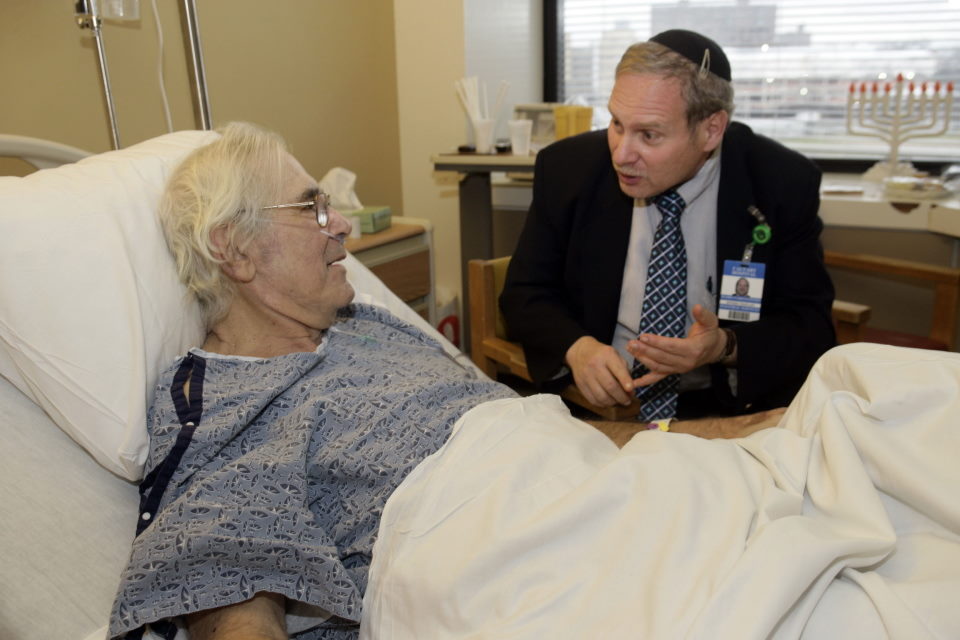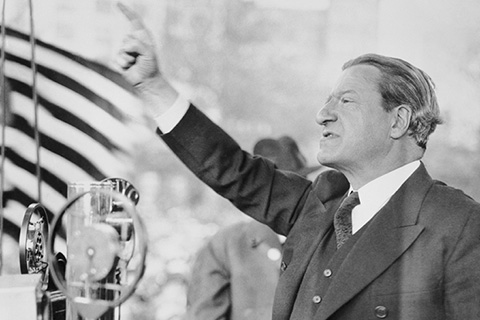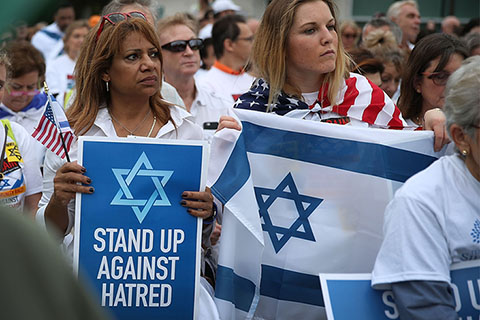Chaplains: The Unsung Heroes of American Judaism

The chaplain at Calvary Hospital in the Bronx, Rabbi Harold Stern, at a patient's bedside.
Photo Credit: Courtesy Calvary Hospital
Oct. 19, 2022
By Lawrence Goodman
As part of her job at Boston Children's Hospital, Susan Harris '78 consoles grieving parents who've just lost a child, supports families with end-of-life care, and comforts children with terminal illnesses.
But on Fridays, in anticipation of the Sabbath, she also gives out challah. Even critically ill children who feel too weak to eat or have lost their appetite will take a few bites of the traditional sweet Jewish bread.
"It can be a turning point," said Harris, the hospital's director of spiritual care. "I don't mean dramatically, but small changes in perspective make a difference."
Such are the responsibilities, obligations, and challenges of a Jewish chaplain. Typically not employed by a synagogue, yet rabbis by training, they work in healthcare, prisons, colleges and universities, and other organizations, offering everything from morale boosters to life-changing spiritual guidance.
And yet, according to a new report by Brandeis scholars Wendy Cadge, Bethamie Horowitz, and several colleagues, the work of Jewish chaplains often goes underappreciated and overlooked.
Hiding in Plain Sight
The report, published by the Brandeis-based Chaplaincy Innovation Lab (CIL), is the most comprehensive examination to date on the state of Jewish chaplaincy in America.
It found there are roughly 1,000 Jewish chaplains nationwide, often serving isolated or marginalized individuals: the sick, incarcerated, and unhoused, individuals struggling with substance abuse, and immigrants.The report also calls for an expanded role for chaplains in American Jewish life by promoting them to leadership positions and involving them in the strategic decisions of major Jewish organizations.
It argues that chaplains have an especially vital role to play in serving the increasing number of non-Orthodox American Jews who are not affiliated with synagogues. The American Jewish population is also disproportionately elderly compared to Americans in general, and among this demographic, there may be a greater need for chaplaincy services.
"Jewish chaplains are a communal resource hiding in plain sight," said Cadge, Barbara Mandel Professor of the Humanistic Social Sciences. "Chaplains are trained to meet people where and as they are."
Among the new report's major findings:
- Major Jewish groups remain "mostly unaware" of chaplains and the vital functions they play. As a result, chaplains are excluded from leadership and involvement in major decisions.
- Training for chaplains may not be adequate. While many rabbinical seminaries now offer classes and programs for aspiring chaplains, there are few national standards for educating chaplains (Jewish and non-Jewish). Based on interviews with chaplains, the report found a gap between what Jewish chaplains learned at school and the skills they need in their jobs.
- The one professional organization for Jewish chaplains, Neshama: Association of Jewish Chaplains, primarily supports chaplains in health care. This leaves many chaplains in non-healthcare settings feeling isolated and without a support network to learn and grow professionally.
Chaplains of the Past
Though the chaplaincy profession dates to the early Middle Ages, Jewish chaplains only appeared in America in the mid-19th century, with the advent of Jewish hospitals. For example, as part of its mission to provide "comfort and protection in sickness to deserving and needy Israelites," Jews' Hospital in New York invited four rabbis to offer patients what was then called "pastoral care."
In 1861, the self-styled "Reverend Doctor" Arnold Fischel lobbied Abraham Lincoln to let Jewish chaplains serve in the military despite federal legislation permitting only Christians. Lincoln compromised, interpreting the phrase requiring chaplains to be of "some Christian denomination" broadly enough to include Jews.
Though rabbis frequently visited Jewish inmates through the 1800s, it wasn't until 1895 that New York state funded an official Jewish chaplain for its prisons. Other states soon followed. Hillels began appearing on college campuses in the 1920s, spreading Jewish chaplains to higher education.
In 2018, Cadge started the Chaplaincy Innovation Lab (CIL) to bring chaplains of all faiths into a conversation with educators and social scientists about the work of chaplaincy and spiritual care.
Earlier this year, CIL released results from a survey showing that about a quarter of American adults had had a chaplain assist, counsel, or visit with them at some point in their lives. More than half of these said their experience with the chaplain was "very valuable."
"When people have distressing periods in their lives, crises, or something that really shakes them, it's often a chaplain who will be poised to help," said Horowitz, research director of CIL's Mapping Jewish Chaplaincy project. "Chaplains are absolutely vital."
Building a Better Chaplaincy
The new CIL report on Jewish chaplains calls for an expanded role for the profession as Jewish organizations reinvent themselves to serve the needs of America's Jews.
The report says that in the past, these organizations have focused on "Jewish survival" and "Jewish continuity." They are now more attuned to what the report calls issues of "resilience and human flourishing."
Chaplains are especially well-suited to help meet these new concerns, the report says.
"We want Jewish leaders who are facing different kinds of problems and dilemmas in their organizations to ask if chaplains might be part of the solution," said Cadge, the CIL's founder and director. "By better integrating chaplains in the Jewish community, we will be able to better care for people who are on the fringes, who are overlooked, or who are not involved with local congregations."
The CIL report offers several recommendations, including:
- Creating a micro-grants program that will allow chaplains in both traditional and new settings to demonstrate how Jewish chaplains can be most effective today and prepared for tomorrow’s most pressing problems. Grants might focus on preventative mental health efforts, community engagement, aging, or end-of-life issues.
- Hiring Jewish chaplains to work at summer camps and day schools where they can play a role in "community building, group celebration, and cultural change" and addressing young people's spiritual and mental health needs.
- Nurturing professional relationships among all Jewish chaplains "through shared programming and educational opportunities."
- Building interprofessional networks among Jewish chaplains and other Jewish leaders.
- As more elderly people want to stay in their homes rather than move into assisted living or nursing homes, "there may be opportunities for Jewish community chaplains to serve elders where they are," the report states.



